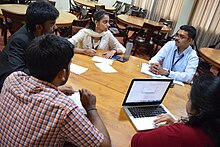
Back مجموعات التركيز Arabic Fokus-qrup Azerbaijani Фокус група Bulgarian Focus groups Czech Fokusgruppeinterview Danish Fokusgruppe German Grupo focal Spanish گروه کانونی Persian Focus group French קבוצת מיקוד HE

| Educational research |
|---|
| Disciplines |
| Core ideas |
| Curricular domains |
| Methods |
A focus group is a group interview involving a small number (sometimes up to ten) of demographically predefined participants. Their reactions to specific researcher/evaluator-posed questions are studied. Focus groups are used in market research to better understand people's reactions to products or services or participants' perceptions of shared experiences. The discussions can be guided or open. In market research, focus groups can explore a group's response to a new product or service. As a program evaluation tool, they can elicit lessons learned and recommendations for performance improvement. The idea is for the researcher to understand participants' reactions. If group members are representative of a larger population, those reactions may be expected to reflect the views of that larger population.[1][2][3] Thus, focus groups constitute a research or evaluation method that researchers organize to collect qualitative data through interactive and directed discussions.[4]
A focus group is also used by sociologists, psychologists, and researchers in communication studies, education, political science, and public health.[4] Marketers can use the information collected from focus groups to obtain insights on a specific product, controversy, or topic.[5] U.S. Federal agencies, such as the Census Bureau for the 2020 decennial census, also use the focus group method for message testing purpose among diverse populations.[6][7]
Used in qualitative research, the interviews involve a group of people who are asked about their perceptions, attitudes, opinions, beliefs, and views regarding many different topics (e.g., abortion, political candidates or issues, a shared event, needs assessment). Group members are often free to talk and interact with each other. Instead of a researcher/evaluator asking group members questions individually, focus groups use group interaction to explore and clarify participants' beliefs, opinions, and views. The interactivity of focus groups allows researchers to obtain qualitative data from multiple participants, often making focus groups a relatively expedient, convenient, and efficacious research method.[8] While the focus group is taking place, the facilitator either takes notes and/or records the discussion for later note-taking in order to learn from the group. Researchers/evaluators should select members of the focus group carefully in order to obtain useful information. Focus groups may also include an observer who pays attention to dynamics not expressed in words e.g., body language, people who appear to have something to add but do not speak up.
- ^ "Definition of FOCUS GROUP". www.merriam-webster.com. Archived from the original on 4 May 2016. Retrieved 9 May 2018.
- ^ "focus group - Definition of focus group in US English by Oxford Dictionaries". Oxford Dictionaries - English. Archived from the original on 9 December 2017. Retrieved 9 May 2018.
- ^ Company, Houghton Mifflin Harcourt Publishing. "The American Heritage Dictionary entry: focus group". www.ahdictionary.com. Archived from the original on 9 May 2018. Retrieved 9 May 2018.
- ^ a b Morgan, David L. (1996). "Focus Groups". Annual Review of Sociology. 22: 129–152. doi:10.1146/annurev.soc.22.1.129. ISSN 0360-0572. JSTOR 2083427.
- ^ Calder, Bobby J. (1977). "Focus Groups and the Nature of Qualitative Marketing Research". Journal of Marketing Research. 14 (3): 353–364. doi:10.2307/3150774. JSTOR 3150774.
- ^ Sha, Mandy (April 2, 2018). "Multilingual Research for Interviewer Doorstep Messages". Census Working Papers (RSM2018-08). US Census Bureau.
- ^ "2020 Census Quick Idea Platform Testing (QIPT) and Campaign Testing Final Report". Census.gov. Retrieved 2023-11-04.
- ^ Kitzinger, J. (1995-07-29). "Qualitative research. Introducing focus groups". BMJ: British Medical Journal. 311 (7000): 299–302. doi:10.1136/bmj.311.7000.299. ISSN 0959-8138. PMC 2550365. PMID 7633241.
© MMXXIII Rich X Search. We shall prevail. All rights reserved. Rich X Search